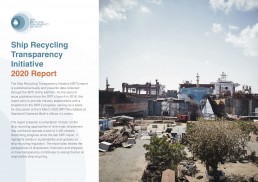
London, 4 March 2020 – The Ship Recycling Transparency Initiative (SRTI) launches its second annual report today, at Tradewinds Ship Recycling Forum in London. The 2020 report presents a compilation of data[1] on the ship recycling approaches of nine major shipowners that combined operate a total of 2,433 vessels (covering ~4-5% of global merchant fleet over 1,000 gross tonnes). Following the recent increase in shipowner disclosures the SRTI now covers 36 per cent of the global container fleet’s tonnage, representing a total market share of 38 per cent.
Describing progress over the last year, the SRTI report also highlights trends in sustainability and updates on ship recycling regulation, sharing the different perspectives of shipowners, financiers and shippers on how transparency contributes to raising the bar on responsible ship recycling.
“The China Navigation Company (CNCo) is very proud to have supported the Ship Recycling Transparency Initiative from its inception, and greatly heartened by the increasing support that it has received, from right across the whole shipping value chain, including those that ship goods, those that carry the goods and those that finance the ships over its first full year,” said James Woodrow, Managing Director at The China Navigation Company whose approach to ship recycling appears on the SRTI online platform. “We are glad to see all these parts of the global trade sector taking increasing and extended responsibility to safeguard the health, safety and social cover for the workers in a hazardous industry, and to minimise and contain any harm to the environment.
“The importance of using the SRTI platform for transparent disclosure of ship recycling policies, processes and practices, to the various rating agencies has been a particularly positive development over the past year. The SRTI shows there is a will to raise the bar and reduce injuries and deaths, shining a light on what is possible – at minimal extra cost – and on shipping’s role in the circular economy.”
Nick Brown, Marine & Offshore Director of classification society Lloyds Register (LR) said: “Although regulatory standards exist, greater transparency is still needed for safer and environmentally sound ship recycling by the maritime industry. The SRTI, which LR is a founding member of, supports this by providing a transparent platform whereby different stakeholders across the supply chain can disclose their best practices, raising the bar for more responsible ship recycling activities in the maritime industry.
“Recent SRTI data suggests that most shipowners in the platform have ship recycling policies in place which are above the beyond regulatory requirements and can be used as a benchmark for others. The SRTI and its signatories make a fundamental contribution to the improvement of recycling practices and complements the top down regulatory approach.”“Through transparency the SRTI aims to accelerate a voluntary market-driven approach to responsible ship recycling – informing, influencing and improving the supply chain-related decisions made by key stakeholders and ultimately leading to an industry-wide level playing field,” said Andrew Stephens, Executive Director of the Sustainable Shipping Initiative that hosts the SRTI. “We’re seeing a diverse range of maritime stakeholders stepping up their role and calling for transparency throughout a vessel’s entire lifecycle, from shipbuilding to operating to dismantling and recycling.”
-ENDS-
[1] Full disclosure data on individual companies can be accessed via the SRTI online platform: www.shiprecyclingtransparency.org

